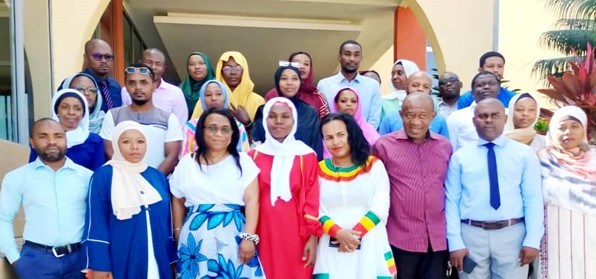
Moroni, 2 August 2024. The COMESA Secretariat partnered with the Investment Climate Reform (ICR) Facility to organize a three-day training workshop on gender disaggregated data and statistics for Comoros from 31 July to 2 August 2024.
The workshop held at Retaj Hotel aimed to equip statisticians, researchers, and policymakers from various sectors with the necessary skills and tools to better understand and address gender disparities across various sectors.
Gender statistics are crucial for informed decision-making. They highlight areas where gender disparities exist and ensure that policies and programmes effectively address the needs of both men and women, and boys and girls for inclusive social and economic development.
The training initiative aligns with the COMESA Gender Policy, Gender Reporting Framework, Council Decisions on Gender Statistics, Minimum Set of Gender Indicators in Africa, and the United Nations Sustainable Development Goals, particularly Goal 5 – Achieve gender equality and empower all women and girls.
Mr. Said Abdou Salime, Secretary General of Ministry of Trade, COMESA Coordinating Ministry, officially opened the workshop, and highlighted the importance of gender statistics to achieve the Sustainable Development Goals.
“The availability and quality of sex-disaggregated statistics must be improved, and a gender perspective must be consistently integrated throughout the planning, implementation and dissemination processes of any statistical data collection project,” Mr Salime said.
He emphasized that gender inequalities within COMESA in different economic sectors influence women’s participation in trade and undermine trade integration in the region.
The Director of Gender and Social Affairs, Mrs Beatrice Hamusonde observed that the workshop was a significant step toward building a more inclusive and equitable society.
The areas in which participants were trained included an introduction to the basics of gender and gender statistics; data collection techniques and best practices for collecting reliable and accurate gender data. Also included was training on data analysis and interpretation as well as implications of using gender data and gender statistics to inform and shape policies and programmes.
By strengthening the capacity to produce and use gender statistics, Comoros will move closer to achieving regional, continental and global targets on gender equality and empowerment of all women and girls. A steering committee comprised of representatives from the national statistics office and the gender commission was constituted to coordinate the collection of gender disaggregated data to feed into the COMESA dashboard on gender and social integration.
COMESA and the ICR Facility are committed to promoting gender equality and empowering institutions as well as individuals through capacity-building initiatives to provide the tools, knowledge and evidence-based research necessary to address critical gender issues. During the three-day workshop, participants were engaged in interactive sessions and hands-on exercises facilitated by a statistics expert.
The ICR Facility is co-funded by the European Union (EU), the Organization of African, Caribbean and Pacific States (OACPS) under the 11th European Development Fund (EDF), together with the German Federal Ministry for Economic Cooperation and Development (BMZ) and the British Council. It is implemented by GIZ, the British Council, Expertise France, and SNV. (Startpage | ICR Facility (icr-facility.eu )
#GenderEquality #SustainableDevelopment #GenderStatistics #COMESA #Empowerment #TrainingWorkshops #ICRFacility

